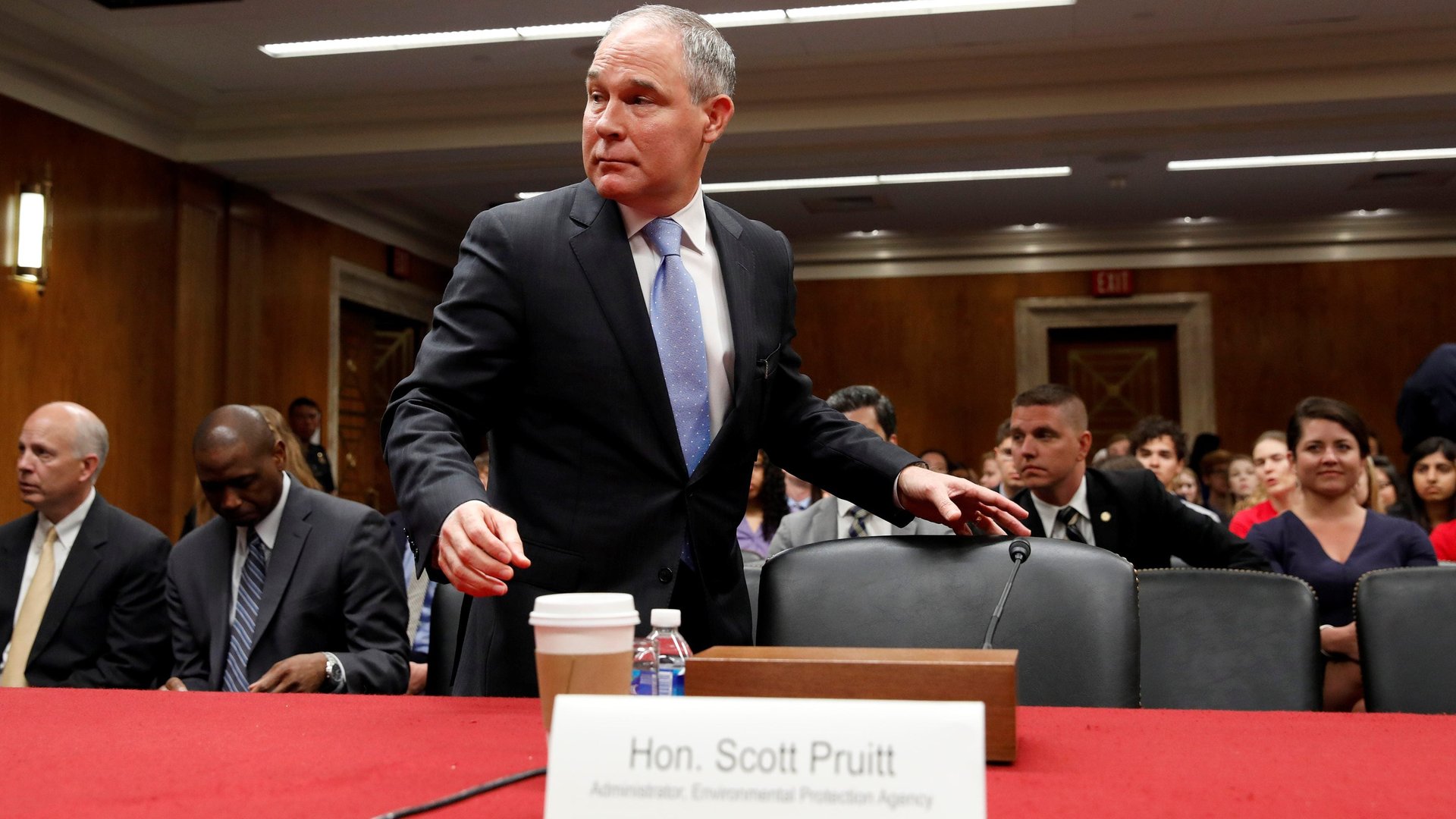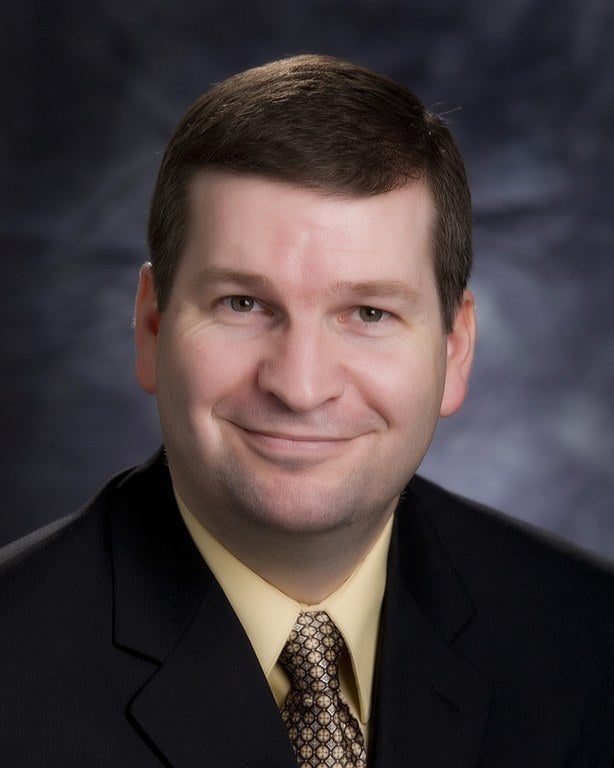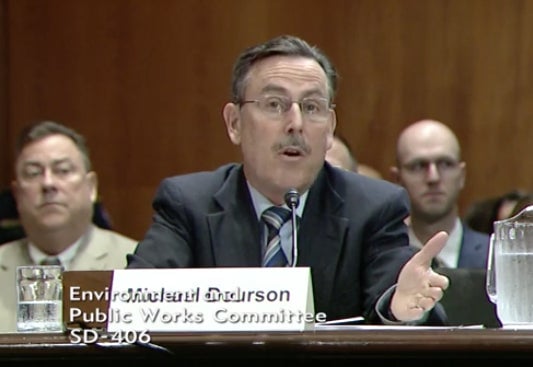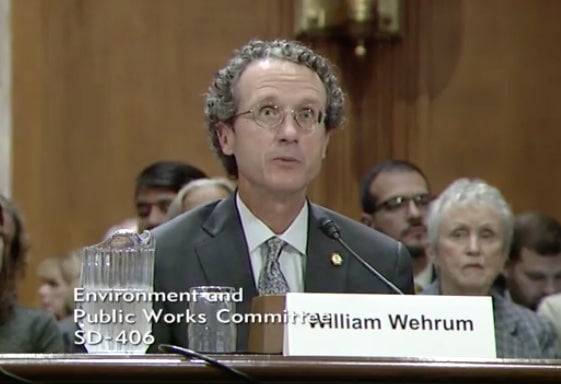Some pollution is good for kids’ lungs, and other beliefs held by Trump health officials
When the US government is deciding which products and pollutants to limit or ban, it doesn’t just depend on science, no matter how clearly researchers are able to demonstrate harm. In most cases, officials from various federal health-related offices decide what science to listen to, which benefits outweigh which costs, and whether (and how) to conduct testing at all. For example, the decision to regulate a toxic substance in drinking water comes down to the “sole judgement” of the person running the Environmental Protection Agency.


When the US government is deciding which products and pollutants to limit or ban, it doesn’t just depend on science, no matter how clearly researchers are able to demonstrate harm. In most cases, officials from various federal health-related offices decide what science to listen to, which benefits outweigh which costs, and whether (and how) to conduct testing at all. For example, the decision to regulate a toxic substance in drinking water comes down to the “sole judgement” of the person running the Environmental Protection Agency.
In other words, what the US officially considers dangerous depends in large part on who is in charge. And the people charged with protecting public health under the Trump administration hold some unorthodox views. For example: Arsenic? Not so bad. Polluted air? Kids’ lungs are the better for it. Pesticides? Children are less sensitive to them than adults. Breathing industrial particles? “People are designed to deal with dust.”
Here are a few of the new deciders:

Michael Honeycutt
Position: Head of the EPA’s Science Advisory Board, a body of experts that provides objective scientific advice to the agency.
Past job: Chief toxicologist at the Texas Commission on Environmental Quality, where he led the department’s fight against Barack Obama’s stricter ozone pollution rules (Scott Pruitt’s EPA has since delayed those rules for a year). He also helped relax Texas’ state rules on pollution, particularly hexavalent chromium and arsenic, both known carcinogens.
In his own words: On ozone, Honeycutt said in 2014 “I haven’t seen the data that says lowering ozone will produce a health benefit. In fact, I’ve seen data that shows it might have a negative health benefit.” He also suggested the EPA’s ozone rules are unnecessary because “Americans likely spend at least 90% of their time indoors.” (Ozone exposure is widely regarded as a contributor to early death, asthma, heart disease, and low birth weight, among other health effects.)
On mercury, Honeycutt said the EPA is “overstating” the risks of exposure, given that the Japanese eat more fish than Americans and seem to be doing well. He wrote that “unwarranted concerns” could be preventing people from eating seafood, “which itself could lead to adverse health effects.” (Mercury is an IQ-lowering neurotoxin and a danger to developing fetuses.)

Michael Dourson
Position: (Nominated) head of the EPA’s Office of Chemical Safety and Pollution Prevention. His nomination passed a Senate subcommittee and will need a full Senate vote to advance.
Past job: Ran the consulting company Toxicology Excellence for Risk Assessment (TERA), which was hired by groups like Dow Chemical, CropLife America, the American Chemistry Council, the American Petroleum Institute, and Koch Industries to study the effects of chemicals. He is a friend of Honeycutt, whose Texas Commission on Environmental Quality hired TERA to review the state’s chemical evaluations.
TERA’s assessments in all these casess typically failed to recognize hazards widely acknowledged by mainstream scientists who aren’t being paid by the chemical industry, the Intercept reports.
In his own words: As the Intercept notes, Dourson once argued that children aren’t more sensitive to toxic substances than adults, and might even be less sensitive. That idea is far outside of the established scientific consensus. In 2002, he authored a paper (pdf) paid for by the American Chemistry Council and CropLife America arguing that children over six months are no more sensitive to chemicals than adults, and may be less sensitive in some cases.
“Taken together, information on the relative sensitivities of children and adults… suggests that the use of additional uncertainty factors to limit environmental chemical exposures is unlikely to provide significantly greater protection to children over 6 months of age,” the paper includes.
Robert Phalen
Position: Member of EPA’s Science Advisory Board.
Past job: Professor of medicine at the University of California, Irvine.
In his own words: “Modern air is a little too clean for optimum health,” he told the American Association for the Advancement of Science in 2012. Clean air is “not good for the children, whose lungs need a few irritants to learn how to ward them off.”
When E&E News asked Phalen about those comments after his appointment to the EPA board this month, he doubled down: “Importantly,” he said, “as particulate air pollution levels have declined in the US, asthma rates have increased.”
Phalen has suggested studies showing children raised on farms and near animals have less asthma prove his point. However, the studies he is likely referencing actually say it is children’s exposure to a more diverse set of microbes that gives them more robust immune systems and lower asthma rates, not their exposure to more particulate air pollution. (Editor’s note: In many cases, growing up on a farm farther from traffic and industrial sites probably means those kids also breathe less pollution than other children, not more.)
Phalen has also advocated for smoking. He “smokes two to four pipes a week,” according to a 2013 Orange County Register article.At the time, he told the paper that a no-smoking policy at UC Irvine was a poor choice, and “social activism.”
“Intellectuals like Einstein insisted on having their photos taken smoking a pipe,” he said.

William Wehrum
Position: Head of EPA’s Office of Air and Radiation.
Past job: Lobbyist and lawyer for fossil-fuel firms, including the American Petroleum Institute (API) and American Fuel and Petrochemical Manufacturers.
In his own words: Wehrum has represented clients who fought several Obama-era health rules, including one to reduce how much silica dust construction workers could legally be exposed to. As ThinkProgress reports, during oral arguments (mp3), Wehrum told the court: “People are designed to deal with dust. People are in dusty environments all the time and it doesn’t kill them.” (Under Trump, the Department of Labor has delayed the silica dust rule.)